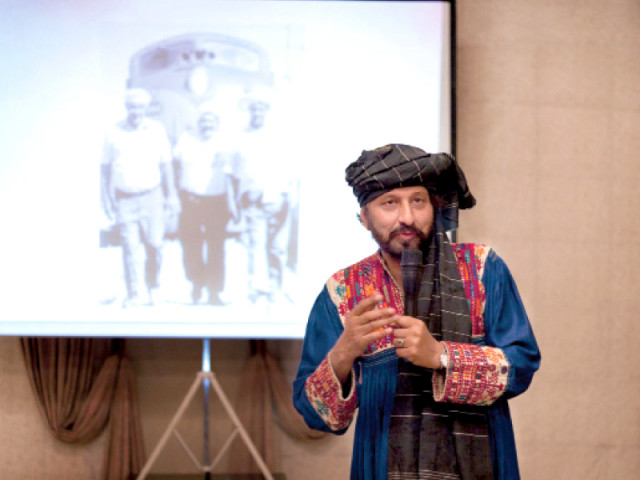Documentary screening: The travails of Koochis across continents
Customs and norms of the migratory of tribe on film.

Guests browse through pictures of the Koochis (left) and the director talking about his experience with the tribe. PHOTO : MYRA IQBAL/EXPRESS
A documentary screening and talk narrating the migration of Koochi (nomad) pastoralists was screened at Serena Hotel on Thursday. Titled “Treading through time: On the tracks of Koochi”, the documentary follows the nomads travelling with their herds of sheep and goats between Northern and Southern Afghanistan and also crisscrossing the Pak-Afghan border in search of green pastures.
The word “Kooch” means migration in Persian language. The documentary focuses on one of the largest group of migratory people in the world who are estimated to be five to six million.
Known to be reclusive, the nomads guard their women and traditions and prohibit filming at all costs. However, a filmmaker Zareef Khan managed to persuade them to live with them and captured scenes of the tribe working as a close-knit unit, tending to their children and livestock with utmost care.
Weathered by the constant travel, the women and children take on the same responsibilities as the men. They do everything from collecting wood, milking the livestock and retrieving water from far flung places.
The Koochis count their wealth not in terms of money but the number of livestock they possess. They nurse the sick or crippled animals with their knowledge of herbs that grow around the areas they travel.
The documentary also shows some of the cultural customs the tribe religiously adheres to. These include making bread from hot ash till instead of using more advanced methods. Then there are marriage rituals and celebration such as the Attan dance which men perform with poise and skill.
Moving on, the documentary makes a passing reference of Koochi Cameleers in Australia from the 1860’s to the early 1900’s.

This parallel was taken up by the Australian High Commissioner Peter Heyward after the screening as he gave a short presentation on the cameleers and the role they played in exploring the vast arid centre of the Australian continent.
“Camels and cameleers were brought to Australia by the Koochi tribe via the Indian pacific during the British Raj. The cameleers as a tribe are now extinct in Australia but there are many Khans and Abdullahs still settled with their families there,” he said.
Clad in traditional Koochi dress, Khan shared his experiences of living with the tribe. “I lived with them and studied their way of life. The men do not allow their women to be filmed yet I managed to gain their trust and film them. Later I founded an NGO to help these people,” he said.
The screening proved a learning experience for the audience members. “I had some knowledge about this tribe and the documentary helped me gain a better understanding and insight into their way of life that not many are even aware of. Perhaps more can be done to preserve this tribe,” said an NGO worker.
Filmed by the Abid Zareef Khan Foundation and funded by the UNDP, the documentary is based on the first ever research project about the Koochi nomads conducted by the foundation. The screening was organised by the Asian Study Group.
Published in The Express Tribune, February 9th, 2013.



















COMMENTS
Comments are moderated and generally will be posted if they are on-topic and not abusive.
For more information, please see our Comments FAQ